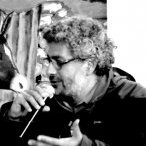English · Español

25 de enero de 2013 | Entrevistas | Anti-neoliberalismo | Industrias extractivas | Luchadores sociales en riesgo
What is Extractivism?
Interview with Gustavo Castro at the Mesoamerican Meeting Against Mining in Oaxaca, Mexico
Descargar: MP3 (1.4 MB)
Although extractivism as an industrial model of appropriation of resources is an old phenomenon in Mesoamerica, there has been a recent increase in this practice that ignores national borders and affects communities with irreversible destruction of nature and common goods.
Gustavo Castro of Otros Mundos Chiapas, Friends of the Earth Mexico talks about the different types of extraction in Mexico that affect the communities’ labor, their traditional seeds and their livelihood, water and energy while the only beneficiaries are the corporations.
“An industrialization where costs are eliminated and profits increased at the expense of extracting raw materials and exploiting workers” is the common pattern in several Mesoamerican countries nowadays.
The new aspect exposed during the meeting held in Oaxaca state, Mexico from January 17 to 20, is the accelerated appropriation by transnational corporations of different sectors under the same modus operandi based on the model of Canadian mining corporations.
Organizations and networks from Honduras, Guatemala, El Salvador, Canada and Mexico participated in the meeting and exchanged their experiences.
“70 to 80% of extraction takes place through open pit mining, which destroys the forests. Nature does not regenerate and acid continues to drain. This means thousands of years of pollution and displacement”, said Gustavo Castro in interview with Monica Montalvo for Real World Radio.
The environmental activist linked the presence of mining corporations facilitated by regulations that seek to preserve and protect corporate interests, with State violence and repression against those who oppose mines because they are being directly or indirectly affected by them.
He said “these mining corporations file millionaire lawsuits. If the governments would join the communities’ demands and decided to close down one mine the corporations would sue them for astronomical figures”.
“Wherever there is mining there is resistance and violence”, said Gustavo.
About the strategies to follow, Gustavo said that from the exchange of experiences we conclude that the most effective method right now is taking precautions because once the investment is made it is really hard and painful in terms of human costs to undo it, even more so to recover the affected areas”.
“Which is why the communities are reacting, awakening and trying to put barriers in the territory to avoid new investments. Once the investment is here it becomes more difficult”, said the Mexican environmental activist.
The Mexican and Mesoamerican experience of resistance to mining has led to the creation of many networks like the Mexican Network of People Affected by Mining (REMA) and the M4 (Mesoamerican Movement Against the Mining Extractive Model).
Gustavo said he thinks Mexico will pass new legislation to end with the territorial resistance and called the attention about the upcoming negotiation and signing of the TransPacific Agreement which, he says, will be more damaging for the communities than the failed Free Trade Area of the Americas (FTAA).
Interview by Mónica Montalvo for Real World Radio.
Photo: MAJLOC








